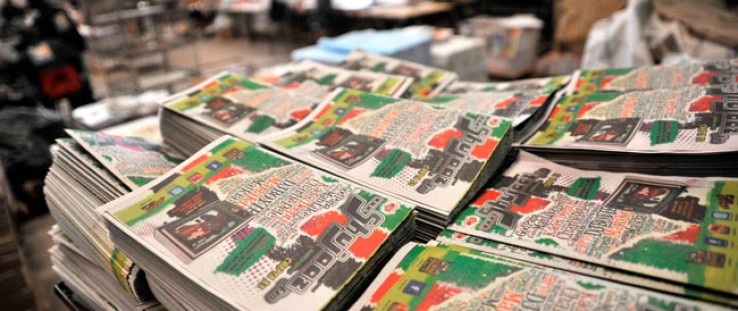 Through comic books, radio, social media and animation, Shujaaz.FM reaches 5 million Kenyans every month.
Riccardo Gangale, USAID
Through comic books, radio, social media and animation, Shujaaz.FM reaches 5 million Kenyans every month.
Riccardo Gangale, USAID
 Through comic books, radio, social media and animation, Shujaaz.FM reaches 5 million Kenyans every month.
Riccardo Gangale, USAID
Through comic books, radio, social media and animation, Shujaaz.FM reaches 5 million Kenyans every month.
Riccardo Gangale, USAID
On Dec. 27, 2007, Kenya’s incumbent president, Mwai Kibaki, was declared the winner of the presidential election. What followed next was a political, economic and humanitarian crisis.
Supporters of Kibaki’s opponent, Raila Odinga, alleged electoral manipulation. They went on a violent rampage in several parts of the country, most noticeably in Odinga’s homeland of Nyanza province and the informal settlements of Kibera in Nairobi, part of his ethnic Lang’ata constituency. Police shot a number of demonstrators, including a few in front of TV news cameras, causing more violence directed toward the police.
These are the events that gave birth to a fictional character code-named DJ Boyie, who stars in a colorful comic book called Shujaaz.FM.
Shujaaz translates to mean “heroes” in sheng—a Kiswahili-based slang spoken primarily by Kenya’s urban youth.
DJ Boyie is an electronics and radio fanatic who sports a pair of clear glasses with black frames and a red sweater that he loves to wear under a torn and stitched purple jacket with green patches around the elbows. To complete his look, DJ Boyie sports what all the young, hip kids in Kenya are wearing—blue jeans and a distinctive, kinky hairstyle.
The plucky protagonist just completed his secondary education and has spent a lot of time looking for a job. DJ Boyie eventually gets tired of doing nothing and decides to build a radio station in his keja—sheng for a young man’s house, or bachelor pad. Armed with his technical skills and free time, he occasionally hacks into the airwaves of other FM stations, disrupting normal programing, and broadcasts a five-minute radio show that engages the youth in a constructive discussion about their future from the comfort of his bedroom.
The comic book reaches a monthly audience of more than 5 million. And in 2011, USAID/Kenya invested $1.1 million in the Shujaaz.FM Multimedia Youth Communications Initiative to help the wildly popular series and related radio broadcasts continue to influence Kenya’s youth in the run-up to the general elections in March 2013, when Kenyans will again vote for a president and national assembly and, for the first time, for senators, county-level governors and local parliaments.
“With the youth being the largest age group in Kenya—three-quarters of all Kenyans are under 30—ensuring that the violent events of 2007 and 2008 are not replicated in the 2013 elections is the priority development challenge,” says USAID/Kenya Mission Director Karen Freeman.
Origin Story
Rob Burnet, the founder of Well Told Story, an Emmy Award-winning communications company in Kenya, is the brains behind DJ Boyie’s technological brawn.
He witnessed how Kenyan youth had been manipulated by their political leaders to maim, rape, loot and kill.
“After the elections in 2007, everyone said that their biggest concern was young people with not enough to do, with idle hands, who had become the victims of manipulation by the leaders who have their own agenda, who then left these young people hanging there after they had gone into battle for them. And at the same time, we began this analysis about what media is out there, who’s talking to these young people, who’s delivering alternatives, and that’s where we drew a blank,” Burnet said.
In February 2010, Well Told Story launched Shujaaz.FM as a free monthly comic book designed to positively change how young people live, think and act in a country that is polarized along ethnic lines.
The initial investment came from Burnet’s own bank account. Nine months later, he received a grant from the British High Commission to expand his idea. The comic book is an entirely new concept in Kenya, and is delivered in hard-copy format to reach a wider audience since not everyone in the country has access to the Internet. The comic book is drawn by Kenyan freelance artists contracted by Well Told Story. “They are all under 30, so they are part of our target audience,” explains Burnet.
The comic, written in sheng, is set in a fictional world that mirrors the real one, and aims to inspire and motivate Kenyans between the ages of 18 and 35 to get involved in political and social issues that affect their future.
For instance, one issue of the comic book has a scenario where DJ Boyie uses his mobile phone camera to catch a politician spewing hate speech. Through DJ’s actions, the target audience learns how to report people who incite others through hateful speech.
In real life, Well Told Story packages five-minute radio shows in which an actor portraying DJ Boyie talks to his fans. The pre-recorded radio shows are syndicated to over 26 FM stations across Kenya six days a week, with the Saturday edition running for a full 20 minutes.
DJ Boyie’s Facebook page has captured the eyeballs of tech-savvy Kenyans with over 450,000 page views. Thousands of real-life DJ Boyie fans are on the social media platform, tweeting and texting each other—and DJ Boyie—about what is happening to them and Kenya at large.
Fanboys, Fangirls and Fan Corps
Well Told Story partners with various organizations in the public and private sectors in Kenya for funding and distribution of the comic book. Nation Media Group stuffs copies of the comic book in the Saturday Nationnewspaper. Safaricom—Kenya’s largest mobile network operator—distributes Shujaaz.FM comic books free through its M-Pesa mobile money transfer kiosks. Every month, representatives from Safaricom deliver thousands of Shujaaz.FM comic books to each of the 23,988 M-Pesa kiosks across Kenya. Well Told Story estimates that each of the 600,000 free comic books gets passed around to five readers on average, bringing the readership up to at least 3 million per month.
“Safaricom and Well Told Story have been working together since 2010 to deliver inspiration and opportunities to Kenyan youth by enabling them to access the Shujaaz.FM comic books at no cost. This collaboration has produced positive results in the lives of the youth reached by providing them with educational content, which they have in turn put into practice to enrich their lives and that of their communities,” said Robert Collymore, CEO of Safaricom Ltd.
Foot traffic at Terry Mwandawiro’s M-Pesa kiosk at Kenyatta Market in Nairobi, Kenya’s capital, is high when the magazine is scheduled to be delivered. “Those who come to my kiosk to get a copy of the Shujaaz comic book are between the ages of 14 and 50,” she says.
A girl in a red headscarf walks into Mwandawiro’s M-Pesa kiosk and asks, “Wewe! Chapter 33 ya Shujaaz imekuja?” (Hey! Has the latest issue of Shujaaz comic book arrived?)
Mwandawiro pulls out a copy of issue 33 of the Shujaaz.FM comic book and hands it over to the young woman, 19-year-old Julie Shivachi.
Shivachi confesses that she has been obsessed with the comic book since her friend Lillian gave it to her a year ago, and now always grabs a copy immediately when a new issue comes out.
“I am always on the lookout for business ideas that Shujaaz publishes in their articles,” she says. “Do you know that you can grow sukumawiki (collards) in large trash bags? I read that in Shujaaz.”
Beyond the Page
Burnet explains that the partnership with USAID has led to a wealth of new content for the multimedia effort. For example, USAID’s Yes Youth Can program feeds Well Told Story the issues that are resonating in youth bunge (parliament) meetings of the 20,000 youth bunges that have flourished across Kenya.
One issue that arose in the meetings was the difficulty Kenyan youth face when they turn 18 and are required to get an identity card. Due to lack of knowledge about the rigorous process of obtaining the card, a majority of Kenyan youth end up either waiting too long or failing to get it. Without ID, Kenyan youth cannot be formally employed, they are subject to harassment by the police, and cannot register to vote—an issue of grave importance in the run-up to the March 2013 elections.
In issue 19 of the comic book, DJ Boyie’s friend Philo is asked to give a bribe to a corrupt district registrar officer in order for him to speed up the process of getting his identity card. Philo eventually gives up waiting for his identity card and confesses he joined in with other youth in looting shops during politically motivated violence in DJ Boyie’s fictional world.
Philo’s predicament mirrors the events that took place during the politically motivated violence that gripped Kenya in 2007 and 2008. In the 29th issue of the comic, DJ Boyie talks about the Yes Youth Can program’s My ID, My Life campaign and educates the Kenyan youth on the process of getting an identification card.
“The combination of the comic books, syndicated FM radio, SMS, social media, web and video animation is engaging 5 million youth every month in a huge public conversation; to help change the way people live, think, act and govern in Kenya,” says Burnet.
“Well Told Story has opened a much-needed discussion about the youth dilemma in Kenya. Shujaaz.FM is a good example of where media and communications could be used to avoid a repetition of what happened in Kenya during the pre- and post-election violence in Kenya,” adds USAID’s Freeman.
FACEBOOKING
“Hi Dj B! I am from Mombasa and I am a guy that had lost hope in voting but then came this magazine Shujaaz, and a conversation between Dj B and Philo and I have realized that hope is still alive. I would advise the youth to apply for ID’s while still in high school and that will ensure that they will have them immediately after clearing school,” says Janu—DJ Boyie’s Facebook fan.
“Hi Dj B, the idea on sack farming is really helpful. It has improved my education since I can generate some money through this type of farming to pay for my fees,” says Brian from Nyang’iela Secondary School in Oyugis from Nyanza province in Kenya.







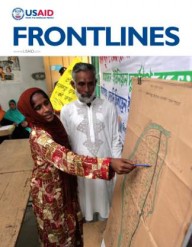

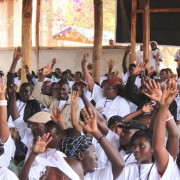
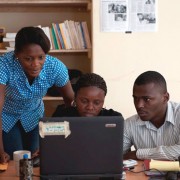
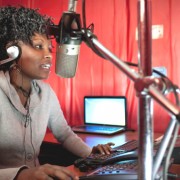
Comment
Make a general inquiry or suggest an improvement.